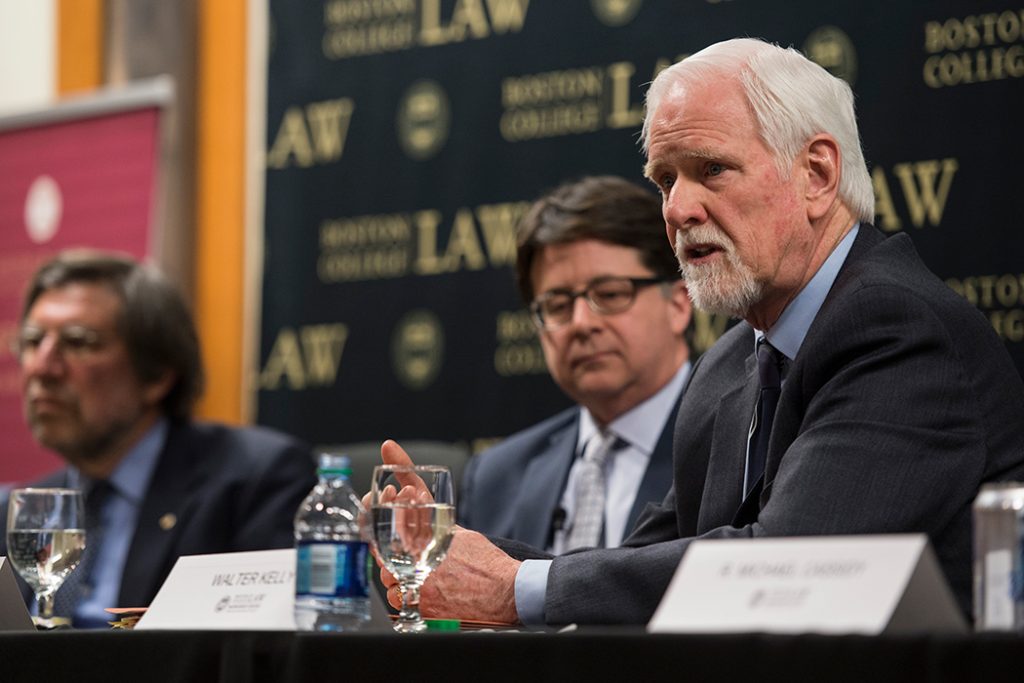Among all the tricky relationships that lawyers handle daily, one that is little understood is the relationship between lawyers and the media. The BC Law community gained a window into this relationship on February 24 when two of the lawyers involved in the recent hit Netflix documentary, “Making a Murderer,” discussed their roles in the Steven Avery civil and criminal cases.
In a nearly two-hour long discussion onstage with BC Law professors Robert Bloom, Michael Cassidy, and Sharon Beckman, Wisconsin attorneys Walter Kelly ’68 and Dean Strang offered a behind-the-scenes look into the Avery cases and the creation of the documentary by Laura Ricciardi and Moira Demos. The event was sponsored by the Rappaport Center for Law and Public Policy and the BC Law Innocence Program.
Avery was exonerated after serving 18 years for sexual assault and attempted murder of Penny Beerntsen in 1985, a case built on highly questionable tactics by the Manitowoc County sheriff’s department. In the midst of a $36 million civil lawsuit Kelly was preparing on Avery’s behalf in 2003, Avery was accused—and ultimately convicted—of a new crime, the murder of photographer Teresa Halbach. Strang handled the criminal case.
Kelly and Strang explained how their ability to cooperate with the filmmakers, whose story scanned the three cases, was the result of the filmmakers first gaining the trust of Avery and his family. Strang praised the crew, describing them as “quick and scrupulous in honoring boundaries,” respecting the lawyers’ and Avery’s privacy when needed.
The attorneys had to live with the local media and be responsive to their day-to-day needs, but with the filmmakers, who had been covering the story for 10 years, it was different, Strang explained. “Our cooperation with them wouldn’t have happened without Avery saying, ‘That’s what I want.’ It would have been unthinkable without Avery’s consent.” Even with that, conversations between the client and his lawyers were off limits. “There were no such recordings,” Strang said.
“Making a Murderer” exposed many of the issues pervading the criminal justice system. In a question-and-answer session with the audience, Kelly and Strang spoke at length about what it means to seek justice in a flawed system. Strang noted that all human beings have biases; we shape the information we receive around our biases and discard information that is inconsistent with our hypotheses, leading us to make incorrect judgments, like ending up “with the wrong guy,” Strang said.
He pointed out that both law enforcement and those arguing innocence can make the same cognitive mistake. Strang cited the hundreds of people who’ve watched 10 hours of a documentary and emailed him from around the world declaring unequivocally Avery’s innocence in the Halbach murder. “It’s the very same thinking error,” he said. “We all fall prey to this.”
The two lawyers explained that coping with a flawed human perspective and system requires coming to grips with failure, both personally and in the system. We need to “accept the flawed system,” Strang said, “and demonstrate humility about what needs to be accomplished.” He noted that lawyers in particular should advocate the importance of process, and the safety that comes from honoring the principles of process. “If you do honor the process, you are less likely to end up with cases that go askew or that are hard to justify later,” he noted.
In response to a question from a student in the audience about upholding values in such a system, Kelly said strength comes from remembering that “there is value content in the law itself.”
As a final salvo on the matter of justice’s many ambiguities, Kelly threw out what he called an “ethical provocation” of his own. He asked: “Should Steven Avery’s life sentence [in Halbach’s murder] be reduced by time served for the crime he didn’t commit?”


